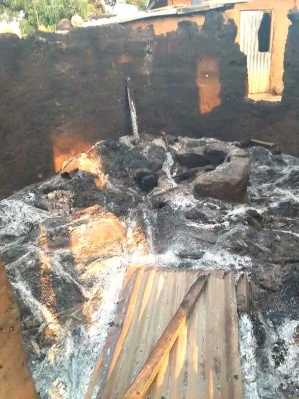
Fulani herdsmen on Friday (July 11) killed five Christians and wounded three others in an area of northwest Nigeria’s Kaduna state where at least 110 others have been kidnapped in the past six months, sources said.
In Kajuru County, “Fulani bandits” on Friday attacked an Evangelical Church Winning All (ECWA) Bible study and prayer service in Kampani village, killing Victor Haruna, Dogara Jatau, Luka Yari, Jesse Dalami and Bawu John, said resident Philip Adams.
He identified those wounded as Samuel Aliyu, Philip Dominic and Jacob Hussaini. Residents said the attack at the church site took place at about 3:30 p.m.
“This is the present predicament of most communities within Kajuru and Kachia Local Council Areas in southern part of Kaduna state,” resident Happiness Daniel told Christian Daily International-Morning Star News in a text message. “We constantly live in fear every day. We can’t sleep in our homes and we can’t go to farms.”
Fulani herdsmen raided Bauda on June 28, kidnapping village head Obadiah Iguda in Kufana District at about 1 a.m., they said. Stephen Maikori, a community leader and overseer of Kufana District, said Iguda’s kidnapping was one among dozens of other abductions of Christian villagers.
“This senseless act of violence has further deepened the atmosphere of insecurity and fear among the residents of Bauda and its surrounding communities,” Maikori said.
On March 12, Fulani herdsmen kidnapped 10 villagers from Unguwan Yashi, Makyali and Ungwan Mudi Doka villages, Maikori said. The attacks began around 2 a.m. in Unguwan Yashi-Maraban Kajuru, where six Christians were abducted, he said.
“In Makyali community, two Christian women were abducted, while two men also suffered gunshot wounds and are receiving treatment,” he told Christian Daily International-Morning Star News. “The bandits struck at Makyali village at about 4 a.m. on Wednesday, March 12.”
In Ungwan Mudi Doka village, two more Christians were kidnapped on the same day, Maikori said.
“On the same day also, a pastor serving with ECWA Church was killed at Unguwan Mulki community,” he said. “This is in addition to the kidnapping of 38 Christians, but eight escaped, leaving 30 others who have remained in captivity.”
In Unguwan Yashi, Fulani herdsmen kidnapped God-Dream Ladan, Lady God-Dream, Philip Mudakas, Mercy Philip, Bitrus Philip and Gmen Philip, he said. In Makyali village, they kidnapped Rahina Yahaya and Zulai Yahaya, while in Ungwan Mudi Doka village, Amos Michael and Samita Amos, were kidnapped, he said.
Fulani herdsmen raiding Buda village on March 10 kidnapped 61 Christians, including women and children, he said.
On Jan. 18 in Agama village, Christian villagers were kidnapped while holding from a funeral service, he added.
“The situation is devastating because we have not heard from their captors nor from the Christian victims since the incidents happened,” Maikori said. “We’re appealing to the government to take action and ensure their return immediately.”
In Unguwar Rogo, Fulani herdsmen set fire to a church building and dozens of houses belonging to Christians, said resident Zamani Ishaku.
“This is a continuation of attacks on our communities which began on New Year’s Day,” Ishaku said.
Resident Ishaya Onnusim said the church building belonged to the ECWA.
“The bandits destroyed properties, stole farm products, burned down six houses, and set the ECWA Church in Unguwar Rogo ablaze after looting valuables from the church and its pastorium,” Onnusim said.
Resident Jonah Dodo added, “It’s with so much pain in my heart to intimate you about the constant attacks on our peace-loving communities by armed Muslim Fulani terrorists, which have continued without the Nigerian government doing anything to stop them.”
Numbering in the millions across Nigeria and the Sahel, predominantly Muslim Fulani comprise hundreds of clans of many different lineages who do not hold extremist views, but some Fulani do adhere to radical Islamist ideology, the United Kingdom’s All-Party Parliamentary Group for International Freedom or Belief (APPG) noted in a 2020 report.
“They adopt a comparable strategy to Boko Haram and ISWAP and demonstrate a clear intent to target Christians and potent symbols of Christian identity,” the APPG report states.
Christian leaders in Nigeria have said they believe herdsmen attacks on Christian communities in Nigeria’s Middle Belt are inspired by their desire to forcefully take over Christians’ lands and impose Islam as desertification has made it difficult for them to sustain their herds.
Nigeria remained among the most dangerous places on earth for Christians, according to Open Doors’ 2025 World Watch List of the countries where it is most difficult to be a Christian. Of the 4,476 Christians killed for their faith worldwide during the reporting period, 3,100 (69 percent) were in Nigeria, according to the WWL.
“The measure of anti-Christian violence in the country is already at the maximum possible under World Watch List methodology,” the report stated.
In the country’s North-Central zone, where Christians are more common than they are in the North-East and North-West, Islamic extremist Fulani militia attack farming communities, killing many hundreds, Christians above all, according to the report. Jihadist groups such as Boko Haram and the splinter group Islamic State in West Africa Province (ISWAP), among others, are also active in the country’s northern states, where federal government control is scant and Christians and their communities continue to be the targets of raids, sexual violence, and roadblock killings, according to the report. Abductions for ransom have increased considerably in recent years.
The violence has spread to southern states, and a new jihadist terror group, Lakurawa, has emerged in the northwest, armed with advanced weaponry and a radical Islamist agenda, the WWL noted. Lakurawa is affiliated with the expansionist Al-Qaeda insurgency Jama’a Nusrat ul-Islam wa al-Muslimin, or JNIM, originating in Mali.
Nigeria ranked seventh on the 2025 WWL list of the 50 worst countries for Christians.





